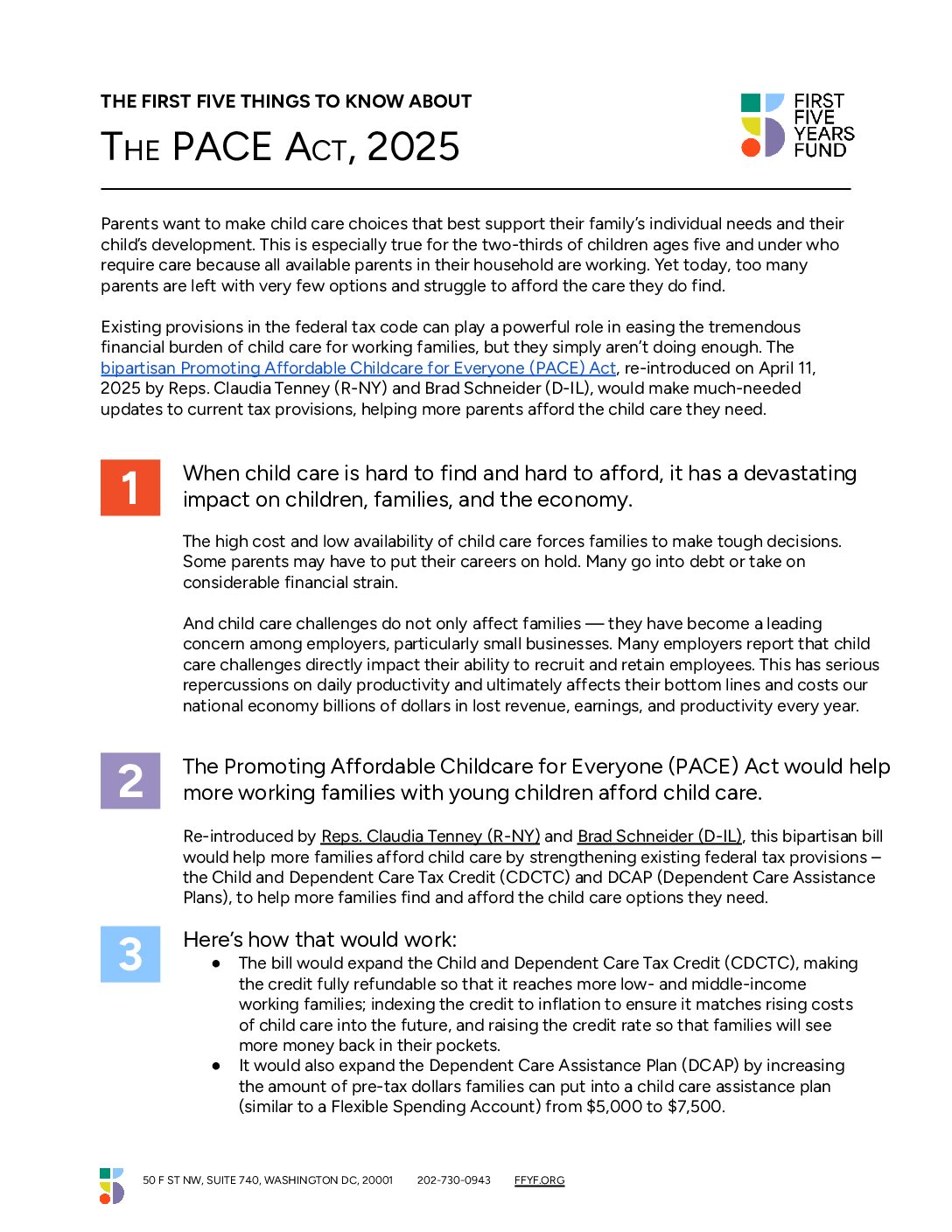The First Five Things to Know About: The PACE Act

Parents want to make child care choices that best support their family’s individual needs and their child’s development. This is especially true for the two-thirds of children ages five and under who require care because all available parents in their household are working. Yet today, too many parents are left with very few options and struggle to afford the care they do find.
Existing provisions in the federal tax code can play a powerful role in easing the tremendous financial burden of child care for working families, but they simply aren’t doing enough. The bipartisan Promoting Affordable Childcare for Everyone (PACE) Act, re-introduced on April 11, 2025 by Reps. Claudia Tenney (R-NY) and Brad Schneider (D-IL), would make much-needed updates to current tax provisions, helping more parents afford the child care they need.

When child care is hard to find and hard to afford, it has a devastating impact on children, families, and the economy.
The high cost and low availability of child care forces families to make tough decisions. Some parents may have to put their careers on hold. Many go into debt or take on considerable financial strain.
And child care challenges do not only affect families — they have become a leading concern among employers, particularly small businesses. Many employers report that child care challenges directly impact their ability to recruit and retain employees. This has serious repercussions on daily productivity and ultimately affects their bottom lines and costs our national economy billions of dollars in lost revenue, earnings, and productivity every year.

The Promoting Affordable Childcare for Everyone (PACE) Act would help more working families with young children afford child care.
Re-introduced by Reps. Claudia Tenney (R-NY) and Brad Schneider (D-IL), this bipartisan bill would help more families afford child care by strengthening existing federal tax provisions – the Child and Dependent Care Tax Credit (CDCTC) and DCAP (Dependent Care Assistance Plans), to help more families find and afford the child care options they need.

Here’s how that would work:
- The bill would expand the Child and Dependent Care Tax Credit (CDCTC), making the credit fully refundable so that it reaches more low- and middle-income working families; indexing the credit to inflation to ensure it matches rising costs of child care into the future, and raising the credit rate so that families will see more money back in their pockets.
- It would also expand the Dependent Care Assistance Plan (DCAP) by increasing the amount of pre-tax dollars families can put into a child care assistance plan (similar to a Flexible Spending Account) from $5,000 to $7,500.

This is long overdue.
- Current CDCTC levels were set in 2001, when the annual average cost of child care was an average of $3,500.
- The amount of pre-tax income parents can set aside in DCAP ($5,000) hasn’t been updated since 1986, when child care costs averaged $64 a week.
- As a result, neither of these credits have kept pace with the current cost of care, which has risen by an estimated 263% since the early 1990s.

The policies in the PACE Act are popular with voters.
- In a 2025 poll, Americans said they overwhelmingly support (86%) expanding the Child and Dependent Care Tax Credit (CDCTC), including 83% of Republicans, 83% of Independents, and 91% of Democrats.
- They also strongly support expanding DCAP, including 86% of Republicans, 80% of Independents, and 83% of Democrats.
The Bottom Line
Pairing tax reform with robust funding to strengthen child care supports families with young children while ensuring greater economic stability across the country. Together, strong funding and tax reform have the power to benefit working parents and young children while supporting economic stability across the country.
Our Take
“Child care costs are continuing to rise, and working parents simply can’t keep up,” said FFYF Executive Director Sarah Rittling. “The Promoting Affordable Childcare for Everyone (PACE) Act takes a significant step towards making care more affordable by updating two important tax provisions: the Child and Dependent Care Tax Credit (CDCTC) and Dependent Care Assistance Plans (DCAP). This legislation is a direct investment in hardworking families who need support as they look to re-enter or stay in the workforce, and we are grateful to Reps. Claudia Tenney and Brad Schneider for their work to provide much-needed relief to parents and caregivers.”
Learn More
- The FFYF Child Care and the Federal Tax Code resource kit;
- Bipartisan bills in the 119th Congress;
- The First Five Questions interview series featuring Rep. Claudia Tenney (R-NY) and Rep. Brad Schneider (D-IL)First Five Years Fund:
- Letters of Support for expanding child care-related tax provisions;
- 2025 polling with support for child care tax provisions.
Subscribe to FFYF First Look
Every morning, FFYF reports on the latest child care & early learning news from across the country. Subscribe and take 5 minutes to know what's happening in early childhood education.




